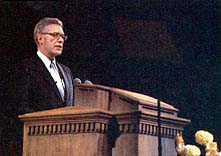by Terrie Lynn Bittner | Oct 22, 2012 | Mormon Beliefs: Christian Values
This weekend I attended the funeral of a friend. As I watched the proceedings, I couldn’t help but note that while there are many similarities between Mormon funerals and others, there are also differences. Those differences are significant because they illustrate the way Mormons view their beliefs.
The first thing a person who isn’t Mormon might notice when he arrived at a Mormon funeral is that most of the people aren’t dressed in black. Mormons see the funeral as a time of sadness for those who loved the person who died, but more in the way we’re sad when a friend or family member moves far away and we won’t be seeing them for a long time, not as a permanent end to life or love. We don’t wear black the day the day a friend or family member moves away.
Mormons believe that through Jesus Christ’s atonement, everyone will be resurrected and live forever. Most people will go on to live in Heaven. Only those who are truly evil or have denied the Savior after being shown for certain He lives would be denied Heaven, although not everyone will live with God. The Bible sets out specific requirements for that special privilege, but Mormons do not believe you have to have been Mormon in this life to go to Heaven or even to live with God, although you will have to accept the gospel once you’ve received a testimony of it. All levels of Heaven are wonderful places to spend eternity. (more…)
by Terrie Lynn Bittner | Oct 15, 2012 | Mormon Beliefs: Christian Values
Mormon children are often taught their faith through music, which has been shown to help teachings enter a child’s heart in a way spoken words cannot. The songs they sing on Sundays at church and at home teach basic gospel principles that can help the children learn to live their faith. These songs often come to their minds when they have choices to make about how to live their lives.
“I Will Follow God’s Plan for Me” teaches children that God has a plan for their lives and that choosing to follow it will bring them happiness in this life and in the next life. The song was originally called “I Can Follow God’s Plan for Me.” In the October General Conference, a world-wide meeting for Mormons, the international president of the children’s auxiliary, Michaelene P. Grassli, explained that “can” was changed to “will” to reflect the commitment they wanted children to make to living as God wants them to live. Knowing you can do something is not the same as actually doing it.
In this lovely hymn, children learn that their very lives were a choice, a gift from God who loves us and who cherishes our right to make choices for ourselves—not consequence-free choices, but choices. Mormons teach that after God created our spirits, He allowed us to live with Him for a while in spirit form. We learned about God and His plan for us and built a personal relationship with Him by being in His presence and learning from Him. He was able to observe our choices and our growth. We decided how important God really was to us and how much faith we had in His plan. (more…)

by Terrie Lynn Bittner | Oct 2, 2012 | Mormon Beliefs: Christian Values
Elder Bruce R. McConkie, a Mormon Apostle, wrote the poem “I Believe in Christ” which he recited in 1972 as part of his General Conference address. The poem is the basis for the beautiful Mormon hymn which bears the same title. Elder McConkie requested that noted organist, John Longhurst compose an original hymn using his poem. In his final public testimony he testified of the Savior of whom the poem and subsequent hymn were written, and spoke of one day soon, seeing Him face to face. He had cancer and had been given just two months to live, but managed to live fourteen months more, although very ill during it, because he knew there were things God still wanted him to do. Despite an enormous amount of pain, he continued to do the work of the Lord. After surgery, he said, “I am quite overwhelmed by deep feelings of thanksgiving and rejoicing for the goodness of the Lord to me. He has permitted me to suffer pain, feel anxiety, and taste his healing power.” (Ensign, May 1984, p. 32.)
 He told his wife he was going to give a talk about Jesus Christ at the next General Conference. General Conference is held twice a year and gives Mormons a chance to hear from their church leaders. His wife was concerned because he was so ill. His doctors were afraid that if he tried to give the talk, he would collapse right there on television. However, he was insistent and gave the talk without incidence. He died just fourteen days later, having delivered a powerful testimony of the Lord Jesus Christ: (more…)
He told his wife he was going to give a talk about Jesus Christ at the next General Conference. General Conference is held twice a year and gives Mormons a chance to hear from their church leaders. His wife was concerned because he was so ill. His doctors were afraid that if he tried to give the talk, he would collapse right there on television. However, he was insistent and gave the talk without incidence. He died just fourteen days later, having delivered a powerful testimony of the Lord Jesus Christ: (more…)

by Keith L. Brown | Sep 3, 2012 | Mormon Beliefs: Christian Values
A simple phrase that is used with some regularity in mainstream Christianity is, “What Would Jesus Do?” There are Christians of all ages who wear wristbands and apparel that have the familiar slogan WWJD (What Would Jesus Do) embroidered on them. These emblems of their faith remind them of not only who they are, but as Christians – whose they are, and how they should govern their conduct as they go throughout their daily lives.
 Members of The Church of Jesus Christ of Latter-day Saints have a very similar slogan. Realizing that the real question is not so much, “What Would Jesus Do?”, but rather, “What would Jesus have me do?”, the all-important answer to that question is found in the three word phrase, “Choose the Right!” (more…)
Members of The Church of Jesus Christ of Latter-day Saints have a very similar slogan. Realizing that the real question is not so much, “What Would Jesus Do?”, but rather, “What would Jesus have me do?”, the all-important answer to that question is found in the three word phrase, “Choose the Right!” (more…)

by Terrie Lynn Bittner | Aug 21, 2012 | About Mormons, Mormon Beliefs: Christian Values
Religion, while making use of the intellect, is not primarily an intellectual pursuit. While it is interesting to study the science or history behind a given spiritual topic, this isn’t, ultimately, what gives us a testimony of its truthfulness. A person can know all the facts there are to know about prayer and still not have a testimony that prayer works.
 In order to gain a testimony of a specific doctrine, and ultimately of the church that teaches it, we have to have spiritual experiences with that doctrine. A person who is considering becoming a Mormon is taught to first make certain God wants him to join the church. This involves the process of gaining a testimony. The missionaries who teach the investigator (a person learning about Mormonism) will present facts about the church and will teach the member how to learn more. They will teach him how to gain a testimony—but they can’t give him a testimony. That is an entirely personal responsibility.
In order to gain a testimony of a specific doctrine, and ultimately of the church that teaches it, we have to have spiritual experiences with that doctrine. A person who is considering becoming a Mormon is taught to first make certain God wants him to join the church. This involves the process of gaining a testimony. The missionaries who teach the investigator (a person learning about Mormonism) will present facts about the church and will teach the member how to learn more. They will teach him how to gain a testimony—but they can’t give him a testimony. That is an entirely personal responsibility.
Spiritual experiences help people gain a testimony and they also serve to strengthen a testimony previously gained. They have another purpose as well, one that ensures a successful mortal life. (more…)

by Terrie Lynn Bittner | Aug 20, 2012 | Mormon Beliefs: Christian Values
Two years after the Mormons arrived in Salt Lake City, an amazing event occurred. The people held a celebration of the United States of America. They held a parade at which flags, the Declaration of Independence, and the Constitution were carried. A giant flagpole was created for a huge flag. Speakers at the celebration that followed encouraged parents to teach their children to be patriotic and to honor the Constitution.
 What made this event so remarkable? The Mormons had been victims of a constitution that lacked what would become the fourteenth amendment. Until that time, the Federal government could not force states to obey the Constitution. Even the Bill of Rights was optional, and so states did not have to honor freedom of religion. Knowing this, Mormons had been forced from their homes, shot, arrested without cause, and even been the victims of an extermination order in Missouri. They had fled to Utah, which was then Mexico, in desperation. During the journey, the same federal government that had failed to protect them asked their men to join the military and fight for the United States—and they did. (more…)
What made this event so remarkable? The Mormons had been victims of a constitution that lacked what would become the fourteenth amendment. Until that time, the Federal government could not force states to obey the Constitution. Even the Bill of Rights was optional, and so states did not have to honor freedom of religion. Knowing this, Mormons had been forced from their homes, shot, arrested without cause, and even been the victims of an extermination order in Missouri. They had fled to Utah, which was then Mexico, in desperation. During the journey, the same federal government that had failed to protect them asked their men to join the military and fight for the United States—and they did. (more…)


 He told his wife he was going to give a talk about Jesus Christ at the next General Conference. General Conference is held twice a year and gives Mormons a chance to hear from their church leaders. His wife was concerned because he was so ill. His doctors were afraid that if he tried to give the talk, he would collapse right there on television. However, he was insistent and gave the talk without incidence. He died just fourteen days later, having delivered a powerful testimony of the Lord Jesus Christ:
He told his wife he was going to give a talk about Jesus Christ at the next General Conference. General Conference is held twice a year and gives Mormons a chance to hear from their church leaders. His wife was concerned because he was so ill. His doctors were afraid that if he tried to give the talk, he would collapse right there on television. However, he was insistent and gave the talk without incidence. He died just fourteen days later, having delivered a powerful testimony of the Lord Jesus Christ: 
 Members of The Church of Jesus Christ of Latter-day Saints have a very similar slogan. Realizing that the real question is not so much, “What Would Jesus Do?”, but rather, “What would Jesus have me do?”, the all-important answer to that question is found in the three word phrase, “Choose the Right!”
Members of The Church of Jesus Christ of Latter-day Saints have a very similar slogan. Realizing that the real question is not so much, “What Would Jesus Do?”, but rather, “What would Jesus have me do?”, the all-important answer to that question is found in the three word phrase, “Choose the Right!” 
 In order to gain a testimony of a specific doctrine, and ultimately of the church that teaches it, we have to have spiritual experiences with that doctrine. A person who is considering becoming a Mormon is taught to first make certain God wants him to join the church. This involves the process of gaining a testimony. The missionaries who teach the investigator (a person learning about Mormonism) will present facts about the church and will teach the member how to learn more. They will teach him how to gain a testimony—but they can’t give him a testimony. That is an entirely personal responsibility.
In order to gain a testimony of a specific doctrine, and ultimately of the church that teaches it, we have to have spiritual experiences with that doctrine. A person who is considering becoming a Mormon is taught to first make certain God wants him to join the church. This involves the process of gaining a testimony. The missionaries who teach the investigator (a person learning about Mormonism) will present facts about the church and will teach the member how to learn more. They will teach him how to gain a testimony—but they can’t give him a testimony. That is an entirely personal responsibility.
 What made this event so remarkable? The Mormons had been victims of a constitution that lacked what would become the fourteenth amendment. Until that time, the Federal government could not force states to obey the Constitution. Even the Bill of Rights was optional, and so states did not have to honor freedom of religion. Knowing this, Mormons had been forced from their homes, shot, arrested without cause, and even been the victims of an extermination order in Missouri. They had fled to Utah, which was then Mexico, in desperation. During the journey, the same federal government that had failed to protect them asked their men to join the military and fight for the United States—and they did.
What made this event so remarkable? The Mormons had been victims of a constitution that lacked what would become the fourteenth amendment. Until that time, the Federal government could not force states to obey the Constitution. Even the Bill of Rights was optional, and so states did not have to honor freedom of religion. Knowing this, Mormons had been forced from their homes, shot, arrested without cause, and even been the victims of an extermination order in Missouri. They had fled to Utah, which was then Mexico, in desperation. During the journey, the same federal government that had failed to protect them asked their men to join the military and fight for the United States—and they did.